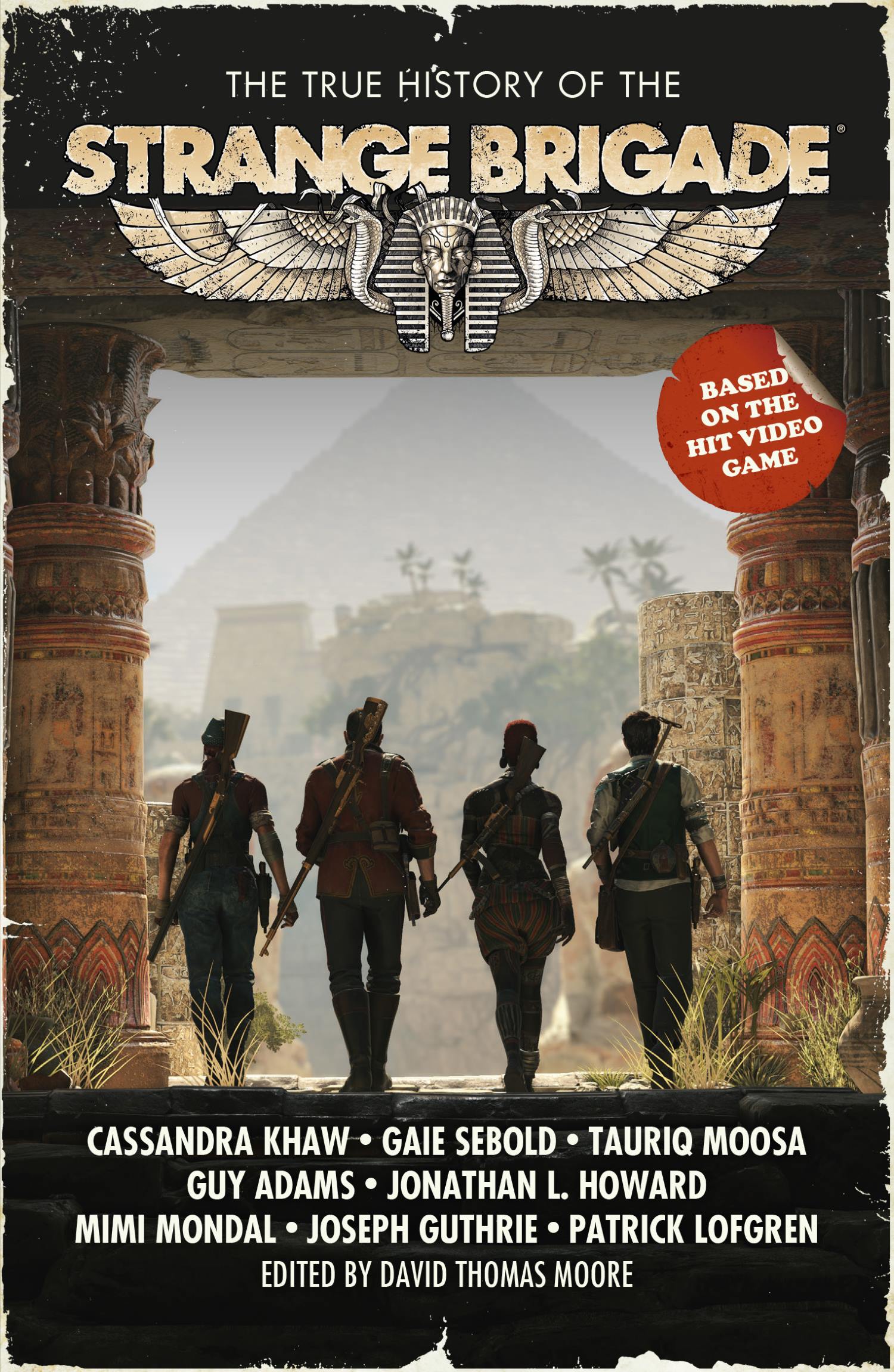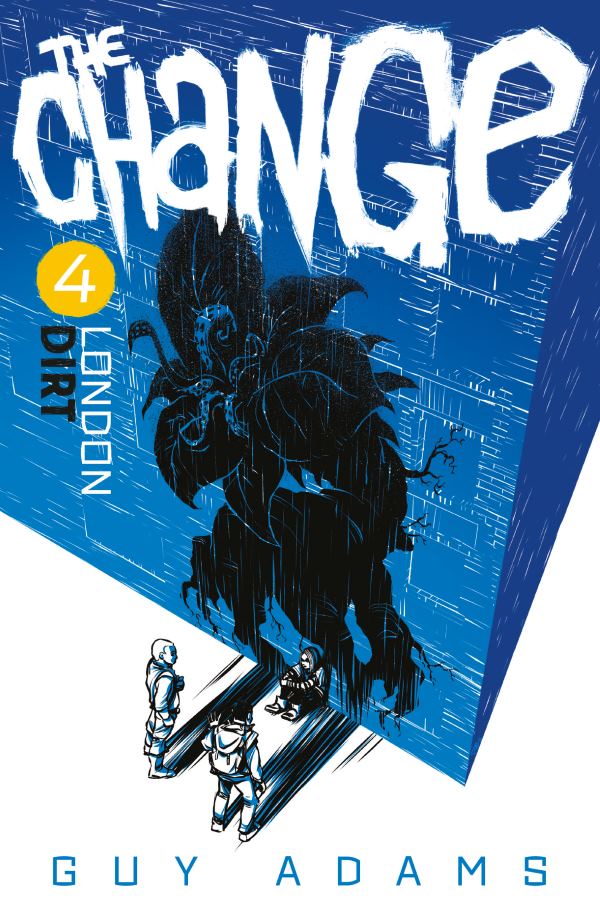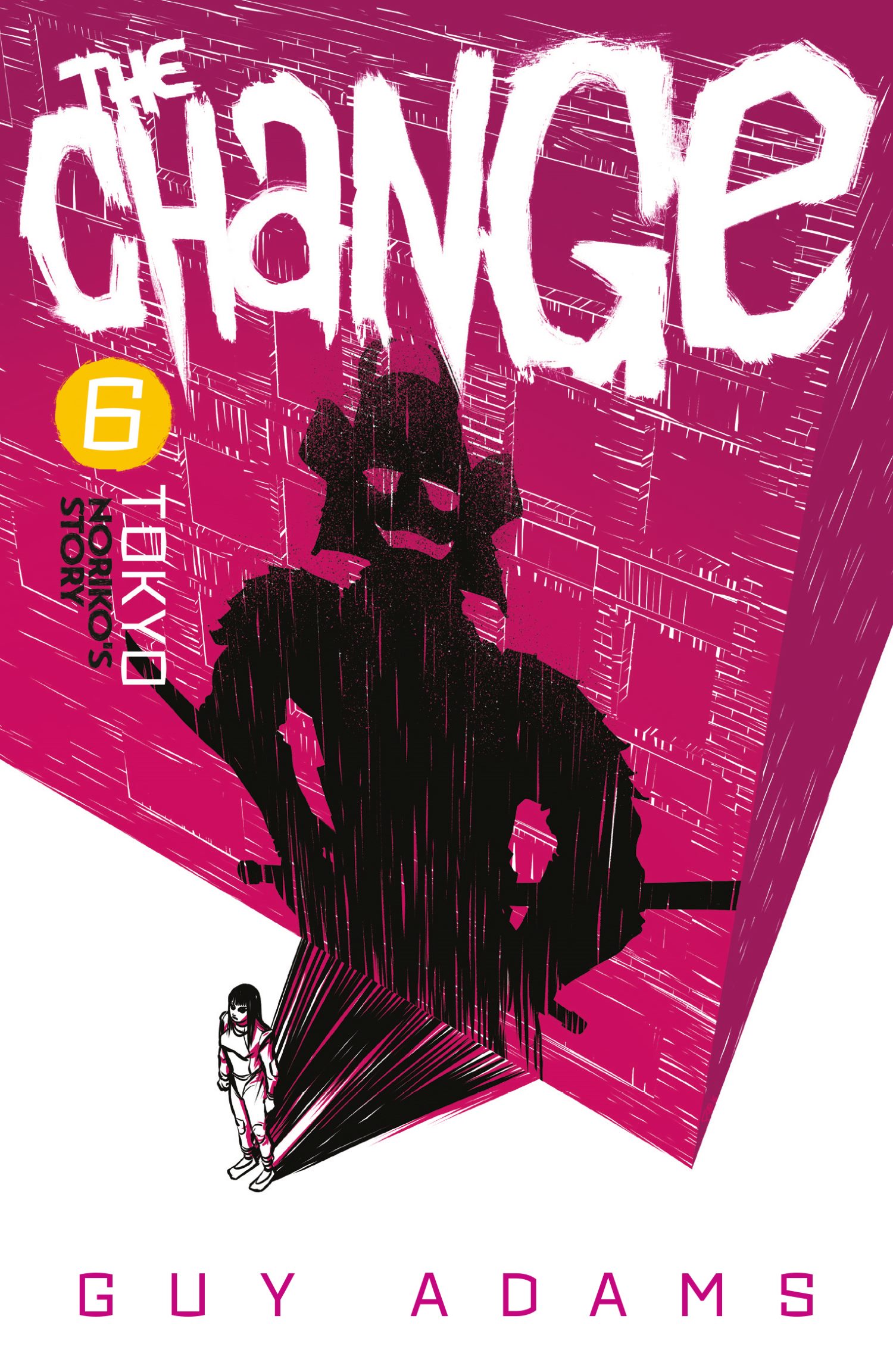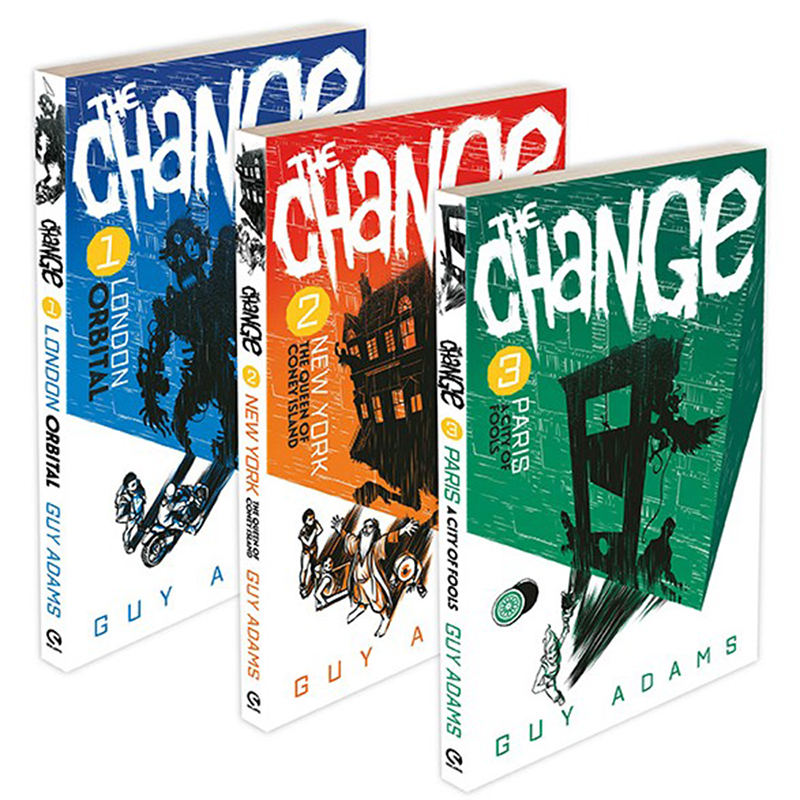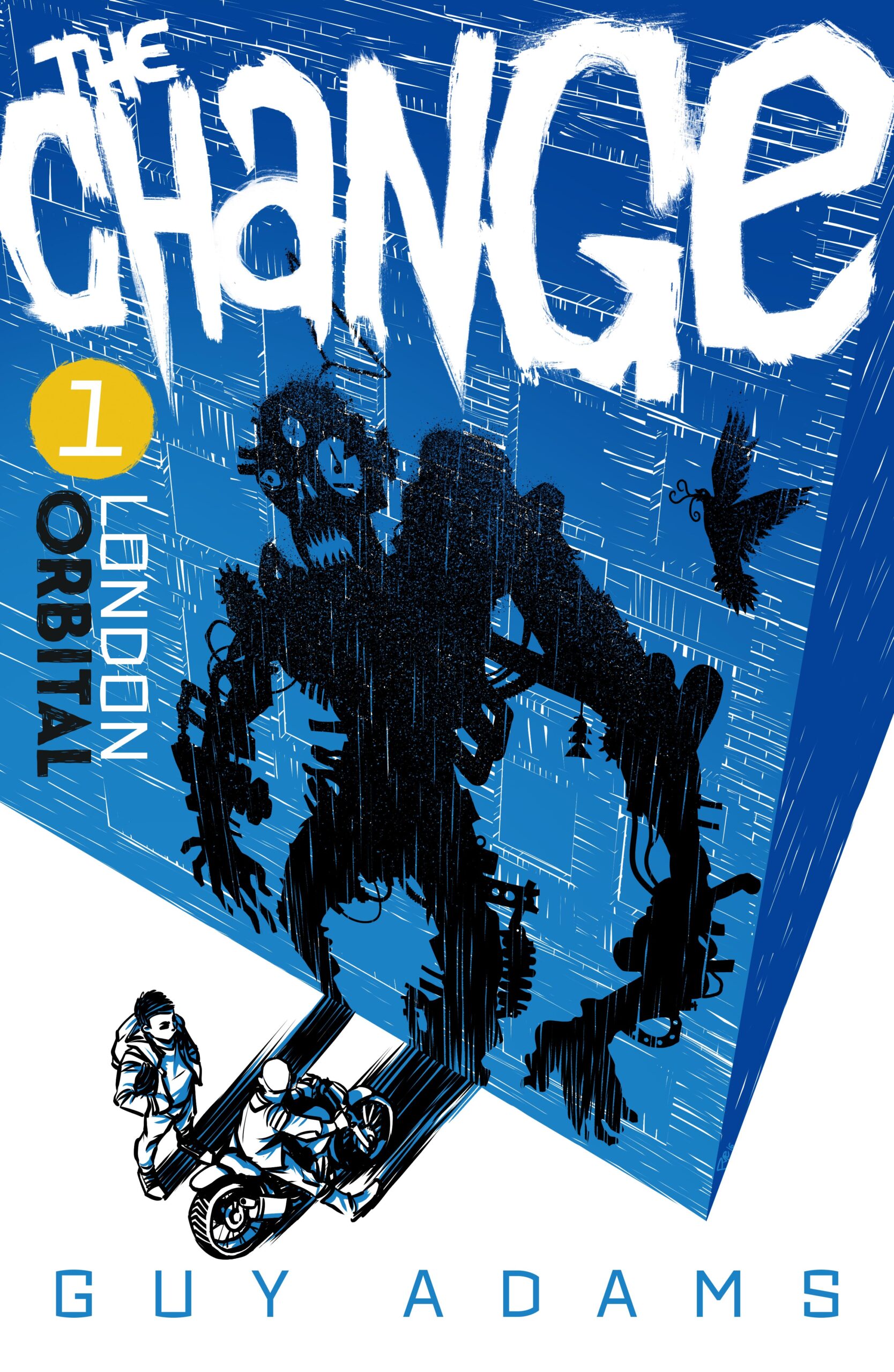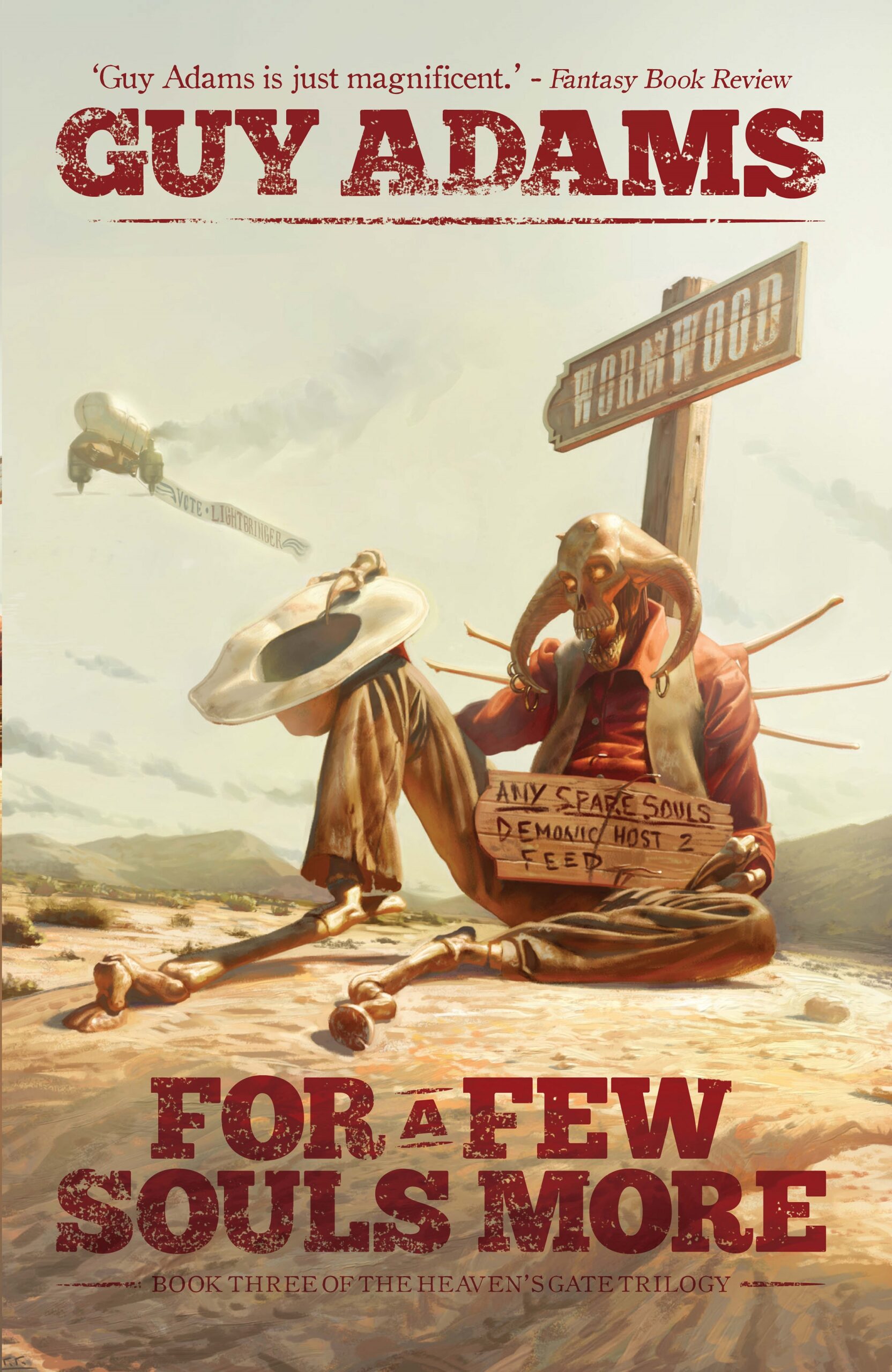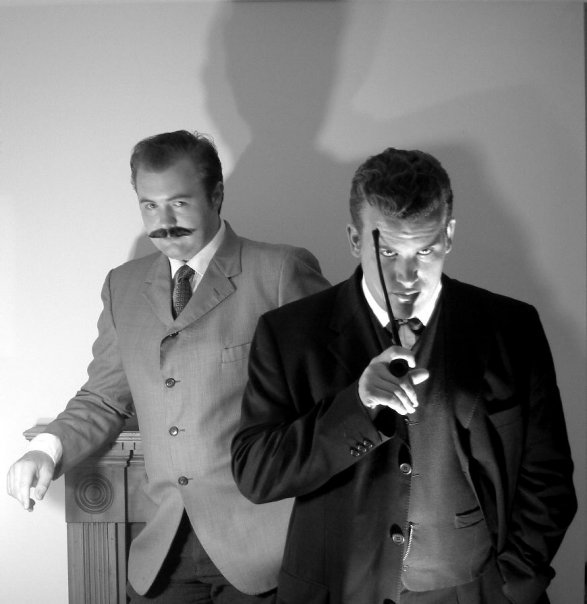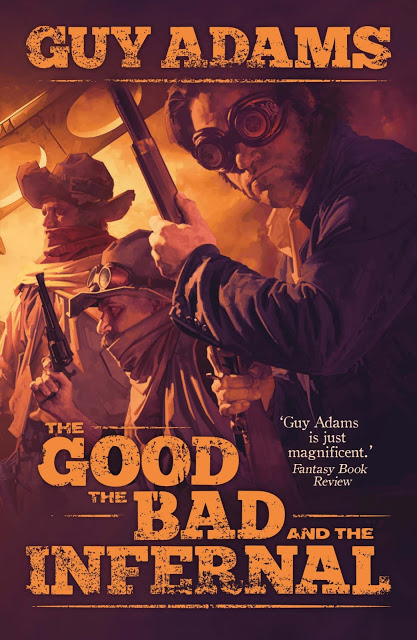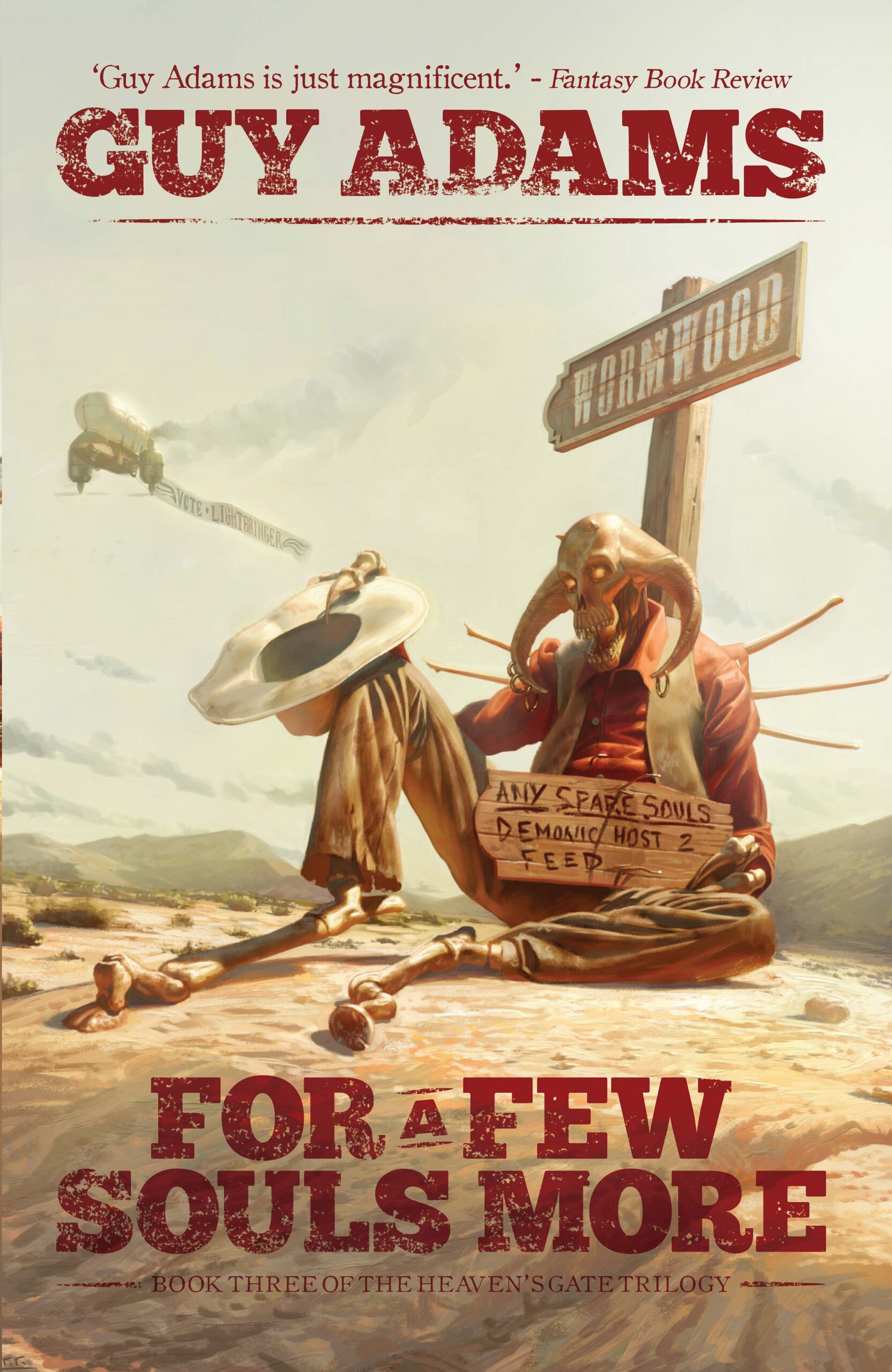
CHAPTER ONE
MAN WHO CAME TO KILL
1.
Two bullets changed the world. The first had already been fired, the second was still to come, resting in its box in the left hand pocket of Atherton’s coat as he rode towards the town of Wormwood.
It was the end of a rushed and uncomfortable journey and Atherton was in no mood for the atrocities that surrounded him. He’d heard the stories and read the report but words on a page don’t prepare you for the sight of a demon.
“Spare a few cents?” one asked him, brushing a plume of gelatinous, weeping fronds away from its mouth.
Atherton had once watched a table of Chinamen eat noodles with chopsticks. The passage of edible string from bowl to lip had seemed endless, as if they had been trying to consume an infinite clutch of twine. He had thought it like an ancient illustration of hellish torment and was reminded of it now. The demon coughed and the fronds whipped forward, some of them sticking to the creature’s forehead, hanging and quivering in front of its small, blue eyes like a mucous-splattered cobweb.
“Damned sickness,” the demon said, brushing the fronds free with its scaly hand. “The things you humans spread around.”
“If I give you money will you buy medicine?” Atherton asked. He had no intention of doing so but the question intrigued him.
“Heavens, no,” it replied, “waste of dollar. I’ll spend it on whisky. It won’t make me better but it’ll make me not care.”
“I’ll save my money then,” Atherton replied, moving on.
“Fuck you very much,” the demon said, falling into a coughing fit.
Atherton continued on towards Wormwood.
According to the reports, it had appeared out of nowhere. Atherton’s natural inclination would have been to dismiss such talk. He had once watched the illusionist, John Nevil Maskelyne seem to conjure a woman out of thin air but he doubted even that august performer could achieve the same with an entire town. Yet Atherton accepted his concept of reality was now in need of refreshment. While his superiors talked politics, terrified of the global ramifications of this new land in their midst, it seemed to Atherton that the real victim was science. He glanced up at a shape in the sky, it had the wings of a vulture but a human body. It swooped and curled in the air, either for the joy of it or on the hunt for a meal, Atherton couldn’t tell. Science, he thought, science may never recover from the presence of Wormwood.
The flying creature issued a cry that brought a hungry seagull to mind. Atherton kept one eye on it, wary in case it should swoop down onto him.
He couldn’t resist guiding his horse in a circuit of the town. He had been told that, while it may appear to be nothing more than a small collection of buildings and streets, once entered it was a gateway to almost infinite space. Impossibility after impossibility.
From a distance the place looked empty. That too was a lie, he was assured. His employers had sent a team of local men to investigate—Atherton had been on the other side of the country and a train could only run so fast—they had all commented on the difference between the town’s external appearance and the sights that unfolded once you crossed its threshold. The real town lay hidden, only visible once you were inside it.
As he watched, this was proven as a small group emerged from one of the side streets and out onto the open plain. They appeared like the resolution of a mirage, a shimmering of silver light, indistinct and liquid, that solidified as they left the influence of the town. There were two men, between them a young girl riding on a horse. They appeared perfectly human but Atherton knew better than to jump to conclusions.
“Good day,” said one of the men, nodding at him and smiling so widely that his thick beard rippled, like a dog shuffling into a comfy position to sleep on his face.
Atherton nodded and smiled back. “Been exploring?” he asked.
“More than that,” the other man said, “setting up house.”
This fellow was clean-shaven and less friendly. When he looked at Atherton it was with analytical eyes. Sensible man, Atherton thought. It was the English accent, that always brought people up short.
“Really?” Atherton asked, looking at the kid, “seems a funny place to call home to me.”
“You new here?” asked the man with the beard. Atherton nodded. “Then maybe you need to get a feel for the place before passing judgment.”
Atherton shrugged. “You hear stories.”
“Yeah,” the man continued, “that’s as maybe but Wormwood’s something you’ve got to experience for yourself.”
The girl smiled at Atherton and he noticed her teeth were moving, rolling up and down like the keys on a clockwork piano.
“Kid needs a dentist,” he said, encouraging his horse past them, continuing towards the town.
He entered Wormwood, passing through the invisible barrier that stood between it and the rest of the world.
The town was bloated with people. Great crowds, both human and demon, making their way along the wide, dirt streets. Everywhere he looked, Atherton saw the species intermingling. America, he thought, the melting pot of the world. He had been stationed over here only two months but he had grown to hate the country. Its chaos. Its contradiction. Its sickening enthusiasm.
A pair of children scuffled together in the dust, one looked perfectly human whereas the other had all the right body parts, just in the wrong places. The human kid laughed and threw a small ball, the demon child leapt to give chase, the legs that sprouted from his rosy cheeks paddling in the dirt as they dragged the rest of his torso behind him, arms clenching and clapping at the rear like a dual tail.
It made Atherton sick.
He tied up his horse outside a tavern, the riotous sound of cheering and laughter washing over him as he pushed open its doors and stepped inside.
It smelled like a place whisky went to die.
An obese creature navigated her way towards him on three legs. Her blouse was torn open to reveal multiple teats, all damp and pink from suckling. “Want milk?” she asked, the nipples turning towards him like the heads of flowers searching for sunlight. Atherton shoved her aside, repelled by the sensation of her bloated torso rippling against his arm.
He made his way towards the bar, teeth gritted. His skin crawled. He fantasised about drawing his gun and shooting indiscriminately into the crowd. Did demons bleed? What colour would the blood be as it splashed its wet heat onto the dirty floorboards?
A man with a separate chunk of flesh for each of his features turned away from the bar, clearing a space. His head reminded Atherton of a book, opened to reveal a handful of thick, fleshy pages. On either side, the ‘covers’ held an ear, then a wedge each for the eyes, the nose and a perpendicular mouth that waved back and forth in the centre with the shifting of the creature’s neck. Atherton didn’t manage to conceal his disgust and the creature’s lopsided mouth sneered to see the man’s revulsion.
“Problem?” the creature asked. It reached up towards its mouth with a three fingered hand and parted the lips. They creaked like rubber and Atherton turned away from the sight of the distended, pink innards revealing themselves like a bloodless wound. The demon threw the contents of his whisky glass into the aperture and then let it slap shut.
“No problem,” said Atherton, though he would love to see if the creature’s mouth could accommodate something larger than a shot of bourbon, a fist perhaps, or a broken bottle.
“What can I get you?” asked the barman, who at least appeared human.
Atherton had given up finding anything that suited his palette in this godforsaken land. “Whisky,” he said, because it couldn’t make his stomach more uncomfortable than the sights that surrounded him.
He gazed into the warped mirror behind the bar as his drink was poured, watching what appeared to be a chimp in a suit as it clambered up the stairs in pursuit of a young woman. She giggled, an enticement, though her suitor needed none, he screeched and raised his hairy fists in the air, a daunting bulge in his trousers proving his appetite was already perfectly sharpened.
“Join me?” asked a woman sat at a table to his right. How her voice had carried over the raucous cheering and cackling was beyond him but, as trickery went, it was small beer considering what else he had experienced.
She was dressed in a frock of satin and lace, the garment blooming in all the places that a proper lady’s would not. A whore, he decided. He had no interest in paying for what fought to expose itself from beneath her skirts but she might be useful in providing information. He sat down.
“New in town?” she asked and he noticed her mouth wasn’t moving.
“Yes,” he replied, “how do you do that?”
“What?” she asked and then touched her lips with her fingers, “oh, the voice,” she continued and this time her lips moved and her tone was different, as if another person was speaking entirely. “I’m a woman of multitudes. Pay me and you can count them.”
“Maybe,” he said, not wanting to put her off, “but first, tell me a bit about the town, would you?”
“What do you want to know?”
“Well, you hear stories on the trail, I guess I just want to know how true they are.”
“It’s hard to exaggerate about this place, honey, take a look around you. I imagine that, whatever you’ve heard, the truth is richer and harder to believe.” She leaned forward and the next time she spoke it was the other voice, the first voice he had first heard. “Why don’t you explore?”
“The town or you?” he asked.
She shifted her chair and hoisted her skirts to reveal the source of her second voice. “There’s nothing out there to compare with what you can find in here,” her sex said, it’s lips parting slightly as it spoke.
The look of disgust on his face didn’t anger her as it had the man at the bar, instead she laughed. “Oh, you are new around here aren’t you? Or are you one of those boys from the mountains? Here to fire up your righteous anger?”
“He just doesn’t know what he’s missing,” whispered the voice between her thighs, “one kiss from me and he’ll be smiling again.”
Atherton drew his gun beneath the table, leaned forward and stoppered her secondary voice with its barrel.
“I think I’d rather only hear from one of you,” he said, looking into the woman’s eyes. “Now tell me about the people in the mountains.”
“They’re like you,” she sneered, “typical men, cold and afraid of what they don’t understand. They look down on us and pray for deliverance, sweet little words to a God who would have ignored them anyway, even if He weren’t dead.”
“You can’t kill God,” Atherton replied. Her sex mumbled its disagreement around an inch of metal but he cocked the trigger and it ceased its complaints. “Can you say the same about yourself?”
“Oh, it would take more than you’ve got to ruin me,” she said, her words heavy with double meaning, “and the minute you pull that trigger you’ll have half of this bar wanting to make games of your offal. So, by all means, shoot your load, boy, I’ll make children of your bullets and invite them to dance on your grave.”
He met her gaze for a few moments more then withdrew his pistol, stood up and marched out of the bar, ignoring the dual peals of laughter that followed him.
2.
Atherton was angry to be leaving the town so shortly after he’d entered it. He had let his anger get in the way of his common sense and could only hope he’d find something of worth in the whore’s words.
He urged his horse towards the mountains that surrounded the town, scanning the horizon for signs of life.
After half an hour’s ride he was forced to accept that he would have to continue on foot, the landscape was too steep for his horse, the route through the rocks too narrow.
Angry and aware that he might never see the animal again, he did his best to find it some shade and cinched the reins between a pair of rocks.
He had been climbing for twenty minutes or so, the sun beating down on him, when he realised he was no longer alone.
He turned to look down at Wormwood, feigning casual interest, a man out for a hike, all the while keeping his hand close to his holster. As he turned he glimpsed a pair of shadows dart out of sight and he tracked their owners to an outcrop just above him and to the left.
“Why don’t you come out?” he asked, keeping his hand close to his gun and looking around for the best natural cover should they decided to reply with gunfire. “I’m no enemy of yours. Quite the opposite.”
“You came from Wormwood?” the voice asked. Atherton was surprised to note the speaker’s accent, it was as British as his own.
“I’ve just been there,” he admitted. “I was sent to investigate it.”
“Sent by whom?”
“Come out and I’ll tell you.”
“Tell me one other thing first: what’s the purpose of your investigation? What do your superiors want to do with the town?”
Atherton smiled. “They have yet to make their intentions wholly clear but I imagine they’ll want me to destroy it. As both a political and spiritual abomination.”
There was a scuffle from behind the rocks and a man stood up, he was wearing a monk’s habit. “Then I can see we are, indeed, allies. I’m Father Martin and I welcome you to our little commune.”
3.
Atherton followed the monk and his companion, a frail-looking man who remained silent, throwing the occasional concerned look in Atherton’s direction.
“You’re from England?” Father Martin asked as they climbed up through the rocks.
“Yes, though I’ve been here a few months.”
“A spy?”
“An observer.”
“Semantics, something I am well conversed in as a religious man.”
“What brought you here?” Atherton asked.
“The town. I travelled over with a larger party. We had all heard the myths about Wormwood and wanted to be here for when it appeared.” Father Martin glanced over his shoulder where the town was still visible. “At the time I had thought I was on a holy mission, perhaps I was, though it’s hard to cling to that.”
“And the rest of your party?”
Father Martin sighed. “Some are still with me, the majority of my brothers. The rest are lost to me. I’m afraid we suffered from a divergence in philosophy.”
“Not unusual for someone in your line of work I’d have thought.”
“My ‘line of work’ has irrevocably changed. We’ve moved from the dust of the library to the open plain. No more discussion of beliefs and theoretical ethics, now the work of Hell is as physical as these rocks, an inarguable thing for all to gaze on.”
“Perhaps that’s a good thing for faith?”
“The very point of faith is that it’s a matter of belief, fighting against that,” Father Martin gestured towards the town, “is not about faith, it’s about fear.”
“Did you see it appear?”
Father Martin nodded. “And I saw it collide.”
“Collide?”
The monk nodded. “That’s our word for it. The moment when it became a fixed part of our world. We can discuss that later. We’re here.”
The track through the mountain dropped down, leading into a hollow space where Father Martin’s people had made their camp. Being a man of practical considerations, the first thing Atherton analysed was the camp’s security. It was well hidden, surrounded on all sides by rocks and would remain unseen until you were right upon it. That said, once discovered, the advantage would rest with the attacker, able to maintain the high ground and shoot into the crater. The camp’s residents would be captive targets. Fish in a barrel. All of this rushed through Atherton’s head before he took in the human details.
It reminded him, unsurprisingly, of a travelling church congregation. The kind of evangelical folk who toured the country en masse, pitching their tent and preaching to the locals before folding the words of Jesus away into their packs and trunks and carting them off to the next town. The people looked drawn and severe, a flock of hungry birds wrapped up in plain feathers. Here and there, fires burned, heating thin stews and watery soups. It was a place of abstinence. A camp of grey people. A place of puritanism and disapproval. Atherton liked it.
“Are you hungry?” Father Martin asked.
Atherton had travelled too far and too hard to refuse a meal when it was offered so Father Martin led him through the camp to a small tent on the far side.
Their companion, sparing just enough time to offer Atherton one last cautious glance, peeled away to rejoin his family.
The monk’s tent was just large enough for two, and they sat in its mouth and ate a meagre portion of bread and cured meat.
Once done, Atherton filled his small pipe and listened to the monk’s tale.
4.
Father Martin told Atherton of his trip from England. He detailed the rest of his party: of his fellow members in the Order of Ruth; Lord Forset and his daughter Elisabeth; the engineer Billy Herbert and, finally, Roderick Quartershaft, the man of fiction who, as well as Wormwood, found his real self, Patrick Irish, at the end of his journey.
He told him of the things they had seen on the road to find their impossible town. Of swarms of bats and tribesmen of iron and coke.
He told him how Wormwood had finally appeared before them, the solidifying of a mirage, a dream writ large in timber and slate.
He told him about Alonzo, the self-appointed voice of God who had pronounced to those gathered on the plain.
He detailed the long hours of waiting, of the near tragedy as Lord Forset’s Land Carriage was stolen and aimed at Wormwood like a steam-powered bullet.
Finally, and by now the sun was beginning to set behind the mountains that surrounded them, he told him of the collision.
“Light flooded the entire valley. There was the sound of a gunshot, such a simple, earthly noise and then the air itself felt as if it was being sucked out of the world. A wind roared and we stumbled, blind and deaf as the reality we had always known shifted around us.”
This was not news to Atherton. It had been felt the world over. A blank moment of thunder and awe, experienced by all.
At the time, Atherton had been in New York, regretting his transfer from Africa, assisting with the Empire’s expansion. Africa had been a land of monsters too, Atherton felt. Heat and rebellion. Bullets and blood. He had done good work there. When the light had come, washing over him, he had half hoped it was the hand of God, coming to claim him from his new station, a city of boredom, and relocate him to somewhere worthwhile. Perhaps, in a way, that is exactly what it had been.
“Then, all was normal again,” the monk continued. “The light vanished, the wind faded and the town lay before us. Only now its streets were open, the way no longer obstructed by the unseen barrier.”
“What caused it?”
“They say…” and here Father Martin’s nerves truly began to show. “It was the death of God. Felled by a bullet.”
“You can’t kill God,” Atherton said for the second time that day. This time he found some agreement.
“I would hope not. Though they say He wanted to die. They say he was wearing the body of a mortal. A child. They say He wanted to know what it felt like to be human. To be finite.”
“Who are ‘they’ that do all this talking?”
Father Martin shrugged. “Stories pass around here as freely as the air. I don’t know how much credence I can give any of them. All I can say is that this has become the accepted version of the events that took place on the other side of Wormwood.”
“In Heaven?” Atherton didn’t bother to keep the cynicism from his voice.
“I know, it’s a hard concept to grasp isn’t it? Again the ethereal, the spiritual, given flesh. Heaven is not a place we would ever have granted geography. Even those of us who believed unequivocally in its presence would think of it as abstract, a place of the mind not somewhere solid. Hell too. These were domains of the soul, that insubstantial, intangible essence. What use did the soul have of walkways? Bricks and mortar?”
He was looking towards Wormwood, Atherton knew, even though it was not visible here in the crater.
“I would always have suspected,” the monk continued, “that, however we visualised the afterlife, God or the Devil, we would be doing so in a reductive fashion. The reality would be even more abstract than our human minds could picture. Actually, the opposite is the case. It’s as solid as we are. Perhaps, given that, it’s not so absurd to believe God may be dead after all. Maybe he was as ruined, as tethered by the flesh as we all are.”
“I remain to be convinced.”
Father Martin smiled. “And to think, earlier I complained that the intangibility of theology was lost to us. Perhaps we have just as many mysteries as we always did. Except now the answers may be found by explorers not philosophers, archeologists not clerics.”
“If our government has its way, that soil will never be dug. They will want the doorway closed. Heaven and Hell, if they exist as physical continents, must be vaster than any other on the map. That they should exist, here… That cannot be allowed.”
“I wonder if that would have been the case had Wormwood appeared in England?” Father Martin asked.
Atherton was not going to be drawn into a political argument, however much he knew that the monk had put his finger on the truth. “You said yourself, that place should not exist.”
“Indeed not. Whatever my beliefs I am no idiot. To have Heaven and Hell on our doorsteps, to be able to walk directly into either…”
“Or to have whatever inhabits them walk into our world.”
“Exactly. It would have been better were that not to have happened. I cannot believe it is what God wants, or, perhaps wanted. What chance does any human soul have if it can simply stroll into paradise? The chaos you saw down there, the monstrosities and the aberrations, they will only be the beginning, of that I’m quite sure. Soon, mankind will match it for its excesses. Can you imagine what our world will be like once people realise there are no limitations? That there is no need to await heavenly reward? That Hell can simply be walked away from? Do you think the human race is strong enough to retain its morality, it’s sense of propriety, in the face of that?”
Atherton held the morality of the world in low esteem and always had. “No.”
“And so, if the doorway can be closed it must, for all our sakes.”
“God’s work?” Atherton smiled.
Father Martin, for all he knew he was being mocked, nodded. “I believe so. And, even if that is the only belief I am left with I will hold onto it.”
5.
After Atherton announced his intention to remain in the camp, at least for now, Father Martin instructed a couple of men to gather the man some supplies. A bed roll, a canopy, a little food and water. These people didn’t have much but they did their best to share.
That night, as the camp slept under the stars, the air filled with the faint sound of smouldering fires and snoring, Atherton lay awake and imagined what might lie ahead.
Father Martin had been right of course, his government’s concern was not a spiritual one. The idea that America now possessed both Heaven and Hell on its soil, vast, powerful landscapes with undreamed of populations; such a thing was terrifying to every other country in the world. Certainly he would not be the only agent of a foreign power currently charged to investigate. He imagined swarms of them were descending from all over the globe. Would those who called the afterlife home ally themselves with the country they were tethered to? Would they attack it? Would they occupy it?
What of the dead? Did they still walk on the other side of Wormwood? How many English citizens were now transported to American soil? How many French? Spanish?
It was an impossible situation and one that his mechanical, rational mind couldn’t readily process. He was not a politician, he was a weapon, a scalpel whose blade was turned onto the body politic so that it could have its diseased flesh removed.
After an hour or so, he thought of his horse and, as he was still unable to sleep, decided he would make the short walk down the mountainside to attend to the animal. He had no feelings for it but it was his transport and a man like Atherton always kept an escape route easily to hand.
He walked quietly between the sleeping people. He was used to moving stealthily at night. The moon was the assassin’s ally and he had worked beneath its light many times over the years.
He scaled the outcrop that hid the camp from view and began to descend, moving carefully over the uneven terrain. As he got lower, Wormwood was revealed. It burned at night. He had proven earlier that the real town could not be seen from outside so the lights that flickered in its windows, the fires that burned in its grates, must be illusory. Real or not, they cast an orange glow on the plain around it that brought infernal imagery to Atherton’s mind. Perhaps Heaven was, indeed, on the other side of that gateway but so far all he had seen was Hell.
His mood was not improved when he discovered the remains of his horse. It was half-eaten, it’s belly open to the stars, their lights reflected in the black pool that seeped from it.
“There are wild animals in the mountains,” said a voice behind him and his gun was in his hand before he had even turned around to face the speaker.
Atherton’s first assumption was that one of the residents of Wormwood had climbed up here to take a look at the opposition. Even by moonlight he could tell that the man’s skin was raw, a mess of shining flesh and scabs.
“I mean no harm,” the man said, raising his hands, “and I’m as human as you, whatever my face may make you think.” He smiled and his teeth glinted unnaturally.
“You look like a demon to me,” said Atherton. “You do this to my horse?”
The man shrugged. “What sort of man would eat a living animal?” He smiled again and Atherton thought the man’s teeth may be false, metal embedded in the gums. “Like I say, there are dangerous creatures out here.”
“Clever ones too, the beast’s mouth is strapped shut with a belt, to stop it from screaming as it was attacked I assume?”
“They call me The Geek,” the man said, ignoring the question.
“What sort of name is that?”
“The only one God left me with, just ask Father Martin, he used to dream of me. Maybe he still does when the moon’s full.”
The Geek sat down on a rock, refusing to show concern towards the gun Atherton pointed at him.
“I was listening to you earlier,” he continued, “when you were talking to the Father.”
“I didn’t see you.”
“Not many do. I’m not so pretty as I used to be and I prefer to keep to the shadows. But I keep my ears open. I like to know what’s going on. You’re here to kill the devils.”
“I’m here to try.”
“I imagine they take some killing. I ain’t tried myself, as tempting as it is.” The Geek looked towards Wormwood. “I’m always interested in unusual creatures, things I ain’t got my hands on before.”
To Atherton this sounded dangerously close to perversion and he was quick to move the subject along.
“How long have you been here?” he asked.
“Since the beginning. I saw it born. Maybe I’ll see it die too. You ain’t alone in wanting that. Can’t imagine you’ll struggle to find an army.” He laughed. “I don’t mean the little mice up there, neither,” he said. “They mean well I guess but they ain’t got a strong arm between them. It’ll take more’n prayers to kill Hell.”
“You’re right,” Atherton admitted. He holstered his gun. It’s not as if it scared the man anyway. “But I imagine Hell has an army too.”
“For sure,” The Geek agreed. He smiled and, again, those metallic teeth glinted by the light of the moon, “I wonder if any of us will be alive by the end of it? Not that it matters.”
“Why?”
“If we die, it ain’t like we have so far to go these days is it? It ain’t nothing but a short walk.”
So saying, The Geek stood up, turned around and vanished into the night.
Atherton, his audience over, took one last look at his gutted horse and returned to the camp and to his plans.
Once he was gone, The Geek re-emerged from the shadows to retrieve his belt from the dead horse’s mouth.
“He seems a mite intense,” he said, aware that he once more had company.
“Doesn’t he?” the man replied. The Geek looked up and smiled to see the look on the man’s face as he gazed down on the dead horse.
“Sight of blood troubles you?” The Geek asked. “I’m surprised, with what you’re planning I reckon you’ll be ankle deep in it before long.”
“Maybe,” the man agreed. “I hope not. So,” he paused for a moment, “you’ll do as I ask?”
The Geek shrugged. “I can’t exactly refuse God now can I?”
WHAT AM I DOING IN THE MIDDLE OF THE REVOLUTION?
(An excerpt from the book by Patrick Irish)
History is built on uncertainty. Nothing grows in barren soil, it needs rain storms, it needs the food brought by rot, it needs heat. The status quo can be a pleasant place to live, but nothing great will ever flourish from it.
When Wormwood appeared it changed the world. At the time of writing, I cannot accurately predict what will come from it. I am still too close, it will be for historians to judge, looking back from the vantage point of years gone by, as to what those changes were and what damage they caused. Still, I am a writer, it is the one and only worthwhile skill I possess and it would be impossible for me not to put pen to paper and attempt to document my place within it all. Perhaps it will be of use to those future historians as they sift through the reports and the articles and draw their conclusions.
I have no doubt that many books will be written about our current times. Though it may seem arrogant, I chance to suggest that mine will be the most valuable. After all, I do not write simply as a spectator. I write as a man who played a part in these proceedings. When the bullet was fired that changed everything, it rang out across the world. That was something we all experienced, every single person on the planet.
But I saw it land. I watched it open a hole in the forehead of its victim. I watched God die.
I was there.
I later discovered how that moment impacted elsewhere, the light, the sound, the shared knowledge that something of universal importance had just happened. From my front row seat, there at the storm’s heart, I fear my experience may seem anti-climactical. It appeared to us, those few in the room, as nothing more or less important as the death of a child. We knew our eyes deceived us, Henry Jones, the blind gunslinger, was a man capable of great horrors but I dare to suggest that even he would think twice before emptying his gun into the head of an innocent infant. The child, the young girl, her toy train pulled along behind her by a length of string, was not all she appeared. She was a skin worn by a greater other, the Greatest in fact. Hankering after a mortal existence, God had poured itself into the flesh and bone of a human child. Jones, having a knife to grind with the Almighty, saw a chance and took it. God had wanted to experience mortality. God did so. At least, that is what we have to assume. Certainly the aftershocks lend credence to the act. As tragic and horrendous as the death of a child might be it doesn’t alter reality. Our history, built on the countless corpses of children, has proven as much.
Many have argued since that God cannot die, whatever complex game He might wish to play. I don’t know. I suspect that is the (understandable) response of a devout mind in fear of losing its anchor in the world. All I can say is: if God is all powerful, God can do anything. That includes putting Himself in a position where his own extinction was not only possible but somehow desired.
Jones certainly considered his work successful, holstering his gun and walking out of that immaculate room with a renewed sense of purpose. I suppose you think one of us should have stopped him? The execution of God is certainly a crime that most would consider worthy of punishment. I can only admit that I—and I presume my companions also—were so shocked at his sudden slaughter that we hadn’t the power to move. I know we were still stood there for long moments after he left, staring at the body of the dead girl—and however much we knew she had been more than that, it was the image we were faced with, a child shot in the head.
It was Soldier Joe that made the first move. He removed his jacket and laid it over her. It wasn’t long enough for the task, her feet poking out from beneath the hem and the slowly expanding pool of her blood would not be concealed by it for long. It was better though, not to have to look at that face fallen slack, the small, red hole just above her left eye.
“I don’t know what else to do,” he admitted, running his hands through his own hair, touching, or so I imagined, the old scar of his own bullet-wound. He had survived his, after a fashion.
I know his history now, of course. All of those years as the brain-damaged messiah for the unscrupulous preacher Obeisance Hicks. Here, in the Dominion of Clouds, he had his faculties, could think and speak and express himself. In the world of the mortals all of these things had been beyond him. He had been at the mercy of his owner, his only friend the woman who stood with him now, his nurse Hope Lane. She doted on him, her feelings for him clearly more than those of nurse and patient. I wonder whether that was another blessing that might only be fully enjoyed now that they had been removed from the narrow-minded beliefs of the mortal world. I am sure the colour of her skin would have been a source of victimisation and disapproval were they to have tried to become a couple. We are not a species known for our acceptance of those we view as different to ourselves, though, of course, the median by which we judged such things was soon to change.
Soldier Joe. I wish I knew his real name, it seems foolish referring to him by such a childlike nickname. On reflection though, perhaps not. Whoever he had been before his accident, it had been a rebirthing. A long and painful one that had only just concluded. Perhaps it is only right in such circumstances that a man be allowed to shed his old name along with his old life.
“What will it mean?” Hope Lane asked, the first of us, I think, to really grasp that the murder we had just witnessed was a beginning not an end. “Will all of this,” she gestured around us, “just crumble? How can the world go on without its God?”
The peculiar, bright white world we had been brought to showed no sign of failing. There was no tremor beneath our feet or distant sound of devastation. While it would be understandable for one brought up on the notion of God as the Almighty glue that both birthed the world and, indeed, controlled it, to expect the Apocalypse in his absence, there was no sign of the End of Days just yet. I am now speaking with the advantage of hindsight of course, I know that life continued, much as a son or daughter might outlive their mother or father. Even then, with Hope’s question fresh from her lips I don’t think I truly feared Armageddon. I think it was partly the fact that we had already been led to believe that God was an absent ruler. We had been brought to the Dominion of Clouds by Alonzo with a view to us helping him fill the vacuum he already claimed to be there. Wormwood, the very myth of it, was purely a method of securing the living souls he had set his sights on. I was to be the author of his new bible, Soldier Joe was the noble martyr, Jones the Devil. In that role, he had certainly made a most promising start.
“We need to speak to Alonzo,” said Joe. “He’s the only one who can explain any of this.”
He moved to the window as if expecting to be able to see the man—if that word fits, and it doesn’t, but forgive me, our lexicon was not built for the stories I must tell.
“He meant this to happen,” said Hope. “You heard what Mr Jones said. They’d talked about him killing God. Alonzo planned it.”
I found myself staring at the remains of our food, splattered against one of the white walls by a sweep of Alonzo’s arm. “He planned a lot of things. What was he saying before he left? A sacrifice?”
“He certainly got one of those,” said Joe, looking at the body beneath his jacket.
Again, my hindsight comes into play. The sacrifice Alonzo intended was not the death of God—or, not just that—it was the planned collision of the vehicle on which I had so recently travelled, the Forset Land Carriage, with the impenetrable barrier that surrounded Wormwood. A rather dull sacrifice you might think, but the Land Carriage contained a number of highly-delicate and dangerous pieces of equipment, some of which, if ignited would have reduced the entire plain, and the many that camped in it, to ash. It would have been a disaster of suitably biblical proportions. It is thanks to the sterling work of my old colleagues, most particularly Forset’s daughter, Elisabeth, that the accident was averted. At the time, however, none of us could have known that.
“The room,” said Hope. “His…” she struggled to remember the name Alonzo had given it, “Observation Lounge.”
The name was unfamiliar to me, but they soon explained it was a room in which Alonzo had maintained a watch on all of creation.
“If he’s not there, we’ll certainly be able to find him,” Joe said.
We filed out of the dining room, making our way along one of the many featureless corridors. I remember thinking, as I had several times, how it could be that Heaven was so empty. Surely, even in a place so vast one would expect to occasionally chance upon another holy soul. Could Heaven really be as vacant as it seemed?
For a Few Souls More is out now – hit the navigation tags at the top of this post for more associated content and further information on the Heaven Gate’s trilogy.
